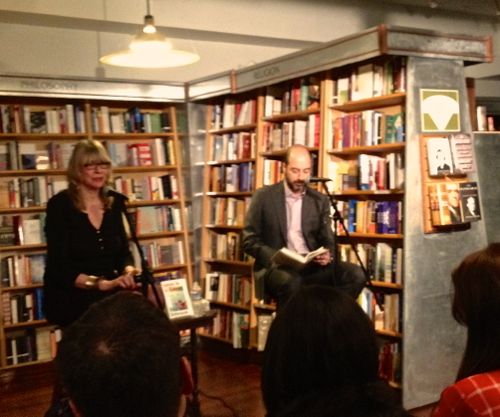Released today, Love Is a Canoe is a third novel by author Ben Schrank. His editor, Sarah Crichton, joined him at McNally Jackson books for a reading and conversation.
New York Magazine suggested skipping the novel last week while the New York Times book review was flattering enough for Crichton to quote from it. The novel follows the lives of several couples spanning multiple generations–this latter point heavily stressed by Schrank and Crichton. Love Is a Canoe also contains a book within the book, Marriage Is a Canoe, a 1970s style marriage self-help manual that serves as a catalyst for the plot: an eager editor wants to revive the success of the older book with a new, modern edition.
Schrank is either well liked or everyone wanted a post-holidays excuse for a night out, and an overflowing crowd piled into the McNally Jackson reading space. Schrank leads off by warning the audience he mumbles. He makes a joke about it, but he’s right. Its not that he’s unprepared. He never trips over his sentences like less experienced readers, but he lacks elocution. Despite his quiet utterances, the jokes of his text appear well timed as he reads and the audience laughs. The narrative is not a stand-up routine, but there is a wry cynicism– a “softly cynical underside” as the NYTimes puts it–that wants the audience to at least giggle.
For the reading, he selected two brief sections from the beginning of the book. His choices do serve to demonstrate how much of the book follows the publishing world. The text had the heavy handed details of a Tom Clancy military thriller but instead of weapons hardware pornography, Schrank writes about book publishing with the kind of details appreciated most by those in the industry. The audience too consists of publishing people — lawyers, editors, and a few others with more ambiguous roles in the trade. And that seems to be the point of Love Is a Canoe: an insiders book for an insiders audience.
The reading portion of the evening ends quickly and Sarah Crichton hurls the audience into the conversation with Schrank by talking about how she fell in love with the book over a personal, emotional connection. She sets Schrank talking about the mechanics of writing the book. Unlike his previous books, he wrote this in short increments–an hour here, two hours there–not in consistent, multiple hour sessions day after day. He has the pressure of career and a family life now. This style results in writing many different parts of the book and then later reshuffling them together. He also mentions how easily the self-help book within the book was to write.
Sarah Crichton talks a bit more about the process. She reads off some quotes from, Marriage Is a Canoe, the book within the novel, and everyone laughs at how insightful this fictional self-help book is: learn to compromise, or end up in circles. Crichton says she related to that bit most. Both she and Schrank’s agent believed in keeping these astute, if humorous observations in the book, but Schrank says maybe it was riskier than he expected.
Crichton and Schrank mention their past lives in the magazine industry. Schrank once edited and wrote for Seventeen. He served as a fiction editor and eventually began writing a column, at least until he “grew out of it.” He appears to have fond memories for the job. Magazines, he explained, created a little box that needed to be filled but that were also limiting, an exercise that ultimately was helpful.
At last, an audience member asked whether he read many self-help books in researching the novel. He read a few, but he admits, reading a real self-help book is a task he finds nearly impossible.
